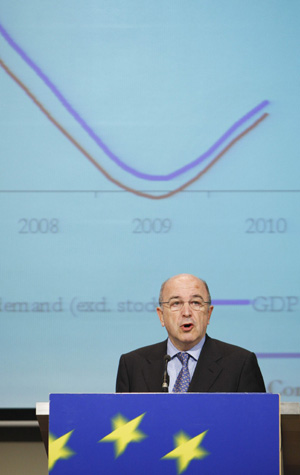|
 European Economic and Monetary Affairs Commissioner Joaquin Almunia presents the EU Autumn economic forecasts during a news conference at the EU Commission headquarters in Brussels November 3, 2008. (Xinhua/Reuters Photo)
European Economic and Monetary Affairs Commissioner Joaquin Almunia presents the EU Autumn economic forecasts during a news conference at the EU Commission headquarters in Brussels November 3, 2008. (Xinhua/Reuters Photo)
Finance ministers from the European Union (EU) countries agreed on Tuesday to a watered-down plan for reform of the global finance system.
The monthly meeting of EU finance ministers aimed to forge a joint European position on how to rebuild the international financial system and avoid repeat of the current financial crisis at a summit of the world's 20 largest economies in Washington on Nov. 15.
"It is a checklist ... that clearly we are trying to push at the global level and on which there was massive support within the group this morning," French Economy Minister Christine Lagarde, whose country holds the EU rotating presidency, told a press conference after chairing the meeting with her EU counterparts.
Based on a ten-page proposal put forward by the French presidency, EU finance ministers agreed to give more power to the international financial institutions, notably the International Monetary Fund (IMF) and the World Bank, where emerging economies like China and India should play a greater role.
They also called for "an information network and an early warning system" that would detect risks to the global financial system.
The plan recommends increased transparency in financial markets, compulsory registration and monitoring of credit rating agencies, new codes of conduct to prevent bank managers from taking excessive risks and harmonization of international accounting and bank capitalization rules.
"The time is coming, we can no longer trust self-regulation on financial markets," Dutch Finance Minister Walter Bos said. "I believe there is a lot of support for that, certainly also on the global level. That's something to be achieved in Washington."
Although EU finance ministers broadly agreed to the plan, differences remain. Following their meeting, EU leaders were due to meet Friday to finalize their proposals for a new global financial system.
Lagarde said the ministers supported all but one point, which encourages "an internationally coordinated response to the macroeconomic challenges to come."
Germany was concerned the wording may imply the need for a super-national economic governance, either at the global or at the EU level.
"It could be interpreted that we are aiming for a coordinated, overarching economic policy" at EU level, said German Finance Minister Peer Steinbruck. "We would be very skeptical about that. We do not need a European economic government."
Berlin has been strongly opposed to a renewed call by French President Nicolas Sarkozy for economic governance in the euro zone, fearing it could undermine the independence of the European Central Bank.
The initial plan was modified after several EU member countries complained it was too detailed and ambitious.
Sarkozy and British Prime Minister Gordon Brown had suggested the establishment of a "supervisory college" that would monitor large financial firms that operate across borders, but it was dropped. Brown's idea to make the IMF a powerful international regulator and financier was also watered down.
"What we are trying to do is to gather as many points of view, proposals as possible," Lagarde said. "We should not overregulate, but we also need to make sure we do not leave loopholes in the regulation."
(Xinhua News Agency November5, 2008) | 